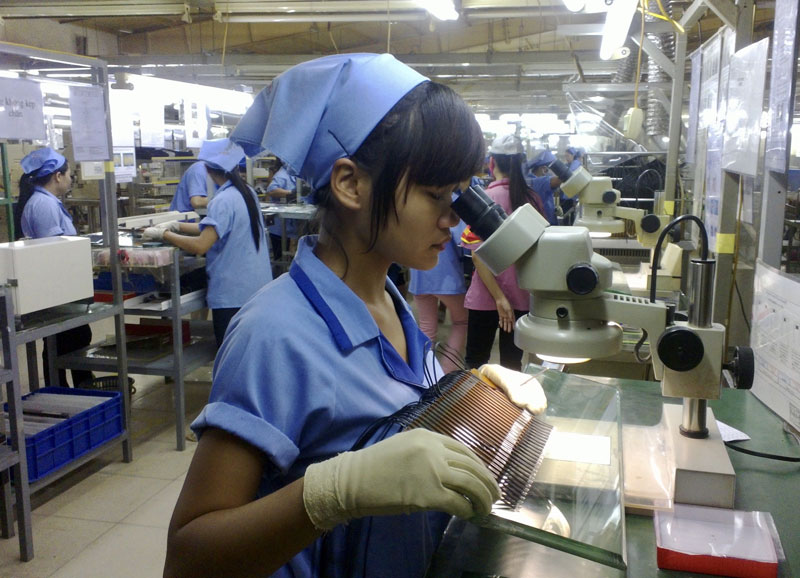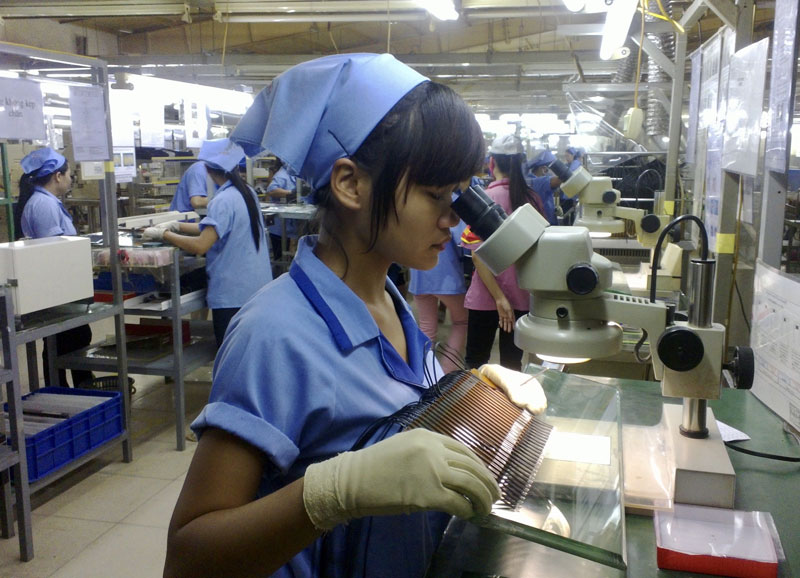
(HBO) – Production and business activities in Hoa Binh province recorded good growth in 2019, according to the provincial Department of Industry and Trade. Industrial and handicraft firms maintained effective operation, while the industry and service sectors accounted for a higher percentage of the province’s gross regional product. Key products of Hoa Binh posted increases compared to the same period last year and surpassed the year’s plan.
 Hoa
Binh-based Sankoh Vietnam Company Limited makes significant contribution to the
province’s industrial growth with its export turnover reaching more than 17
million USD. The firm created jobs for over 1,200 local workers.
Hoa
Binh-based Sankoh Vietnam Company Limited makes significant contribution to the
province’s industrial growth with its export turnover reaching more than 17
million USD. The firm created jobs for over 1,200 local workers.
The province’s industrial production value
was estimated at 37.39 trillion VND (1.61 billion USD) in 2019, a year-on-year
rise of 15 percent and exceeding the yearly plan by 0.01 percent.
During the year, local firms worked to
reduce reliance on sub-contracting and assembling, while investing more in technology
and production equipment. Garment-textile and electronic component
manufacturing enjoyed high growth.
Notably, the production of electronic
devices posted a 2.27 percent increase year-on-year and surpassed the yearly
plan by 0.05 percent, while lens output saw a 0.84 percent rise against the
same period last year, and surpassed the yearly plan by 0.19 percent.
The output of several products in
processing, manufacturing and mining also saw positive growth. Cement and stone
posted increases of 0.53 percent and 10.53 percent, exceeding the year’s plans
by 5.56 percent and 2.44 percent, respectively./.
According to data from the Hoa Binh Provincial Party Committee, the industrial production index for the first six months of 2025 is estimated to have increased by 20% compared to the same period last year. This marks the highest year-on-year growth rate for this period since 2020.
In the first six months of 2025, Hoa Binh province’s export turnover was estimated at 1.145 billion USD, marking an 18.11% increase compared to the same period in 2024. Import turnover was estimated at $ 804 million, a 17.15% increase, which helped the province maintain a positive trade balance.
The lives of the ethnic minority farmers in Tan Lac district have gradually improved thanks to the new directions in agricultural production. This is a testament to the collective strength fostered through the professional associations and groups implemented by various levels of the district’s Farmers’ Union.
With the motto the "product quality comes first,” after nearly one year of establishment and operation, Muong village’s Clean Food Agricultural and Commercial Cooperative, located in Cau Hamlet, Hung Son Commune (Kim Boi district), has launched reputable, high-quality agricultural products to the market that are well-received by consumers. The products such as Muong village’s pork sausage, salt-cured chicken, and salt-cured pork hocks have gradually carved out a place in the market and they are on the path to obtaining the OCOP certification.
In the past, the phrase "bumper harvest, rock-bottom prices" was a familiar refrain for Vietnamese farmers engaged in fragmented, small-scale agriculture. But today, a new spirit is emerging across rural areas of Hoa Binh province - one of collaboration, organisation, and collective economic models that provide a stable foundation for production.
Maintaining growing area codes and packing facility codes in accordance with regulations is a mandatory requirement for agricultural products to be eligible for export. Recently, the Department of Agriculture and Environment of Hoa Binh province has intensified technical supervision of designated farming areas and packing facilities to safeguard the "green passport" that enables its products to access international markets.



 Hoa
Binh-based Sankoh Vietnam Company Limited makes significant contribution to the
province’s industrial growth with its export turnover reaching more than 17
million USD. The firm created jobs for over 1,200 local workers.
Hoa
Binh-based Sankoh Vietnam Company Limited makes significant contribution to the
province’s industrial growth with its export turnover reaching more than 17
million USD. The firm created jobs for over 1,200 local workers.